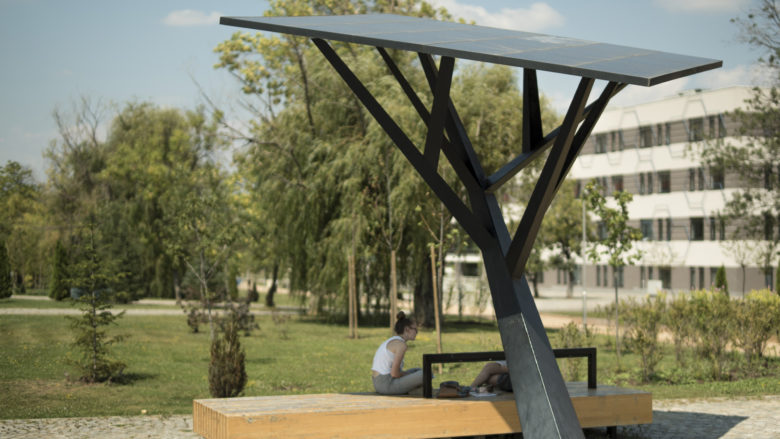Serbian Smart City Bench Startup Strawberry Energy Partners With Ford Motor Company

The Serbian smart city startups Strawberry Energy, which recently announced its expansion in London, announced a partnership with automotive multinational Ford. Together they are rolling out smart benches in London to offer pedestrians free solar-powered mobile charging and Wi-Fi access while they sit and rest across the city. The collaboration will initially provide 20 Ford Smart Benches for those walking, biking and driving through the city.
“The Ford Motor Company Fund is all about making people’s lives better through innovation and access. So, when we find transformational projects like smart benches and work with partners like Strawberry energy, it is not only a home run for Ford Motor Company and our objectives, but for the people that we serve,” comments Jim Vella, president of Ford Motor Company Fund.
Smart benches penetrating London
Last year, the Serbian startup and portfolio company of Bulgarian fund Eleven Ventures, Strawberry Energy has raised €455K in a crowdfunding campaign for the expansion of its smart benches network. Strawberry Energy is already present in 31 cities in 17 countries, including the U.S. and the Middle East, but the European market is the main target for Milisavljevic. So far, the company should have deployed around 200 produced in Serbia benches and has managed to hit its targets from the end of last year.
Growing the network of smart benches in London, however, is the first milestone for the Serbian company, which has already signed a contract with the local government and installed 20 pieces in the city. Seems that the partnership with Ford will further accelerate this process.
Strawberry Energy was founded in 2011 by Milos Milisavljevic, who was back then an engineering student at the University of Belgrade. The initial product of the company was a solar bench called The Strawberry Tree, which captures the sun rays and turns them into usable energy so that anyone can charge their phones and mobile devices and use wireless for free. The Strawberry Tree was the first solar-powered public charger and was used over 10,000 times within the first 40 days, the company stated.
To fit better in public spaces, however, Strawberry Energy needed to develop a smaller, more efficient and marketable product, so the team came up with the Smart Bench. This second product is again a solar-powered bench, but way more compact. It has sensors that collect data from its environment and could optionally function in a network of smart city infrastructure objects.
“Even though we still produce the Strawberry Tree, our main focus is on the Smart Bench as it’s much more scalable and offers more monetization opportunities”, told us Milisavljevic earlier. The team of 13, based between Belgrade and London, is also working on new products of the smart city infrastructure line.
Free energy, expensive data
The Strawberry Tree is smart and there’s also money growing on it. Prior to the crowdfunding campaign the company had already raised €1M from Bulgarian, Serbian and UK investors and it will soon start raising another round to continue expansion.
Even though the startup is not profitable yet, it generates revenues from sales. Surprisingly, the main revenue source are not the benches themselves. “We’re offering the benches as a space for advertisers – both branding the physical bench, but also the distribution of digital content via the free for citizens Wi-fi network. Next step is to start monetizing the data we collect on air quality, traffic, and pedestrians in public spaces”, Milisavljevic explained to us in an earlier conversation.
Two-thirds of Strawberry Energy’s clients are companies from the private sector such as Orange, Ford and Canary Wharf. For the public sector clients, the rules are different – local governments don’t pay for the benches networks and the data.
Strawberry Energy is operating within the Smart City Infrastructure market that’s estimated to reach$1.2 Billion by 2022. Of course, products such as the smart benches represent a very tiny part of this market and the Serbian startup is not the one and only player. There are several younger companies on the market such as the Croatian Include with their bench Steora or the American Soofa.




























